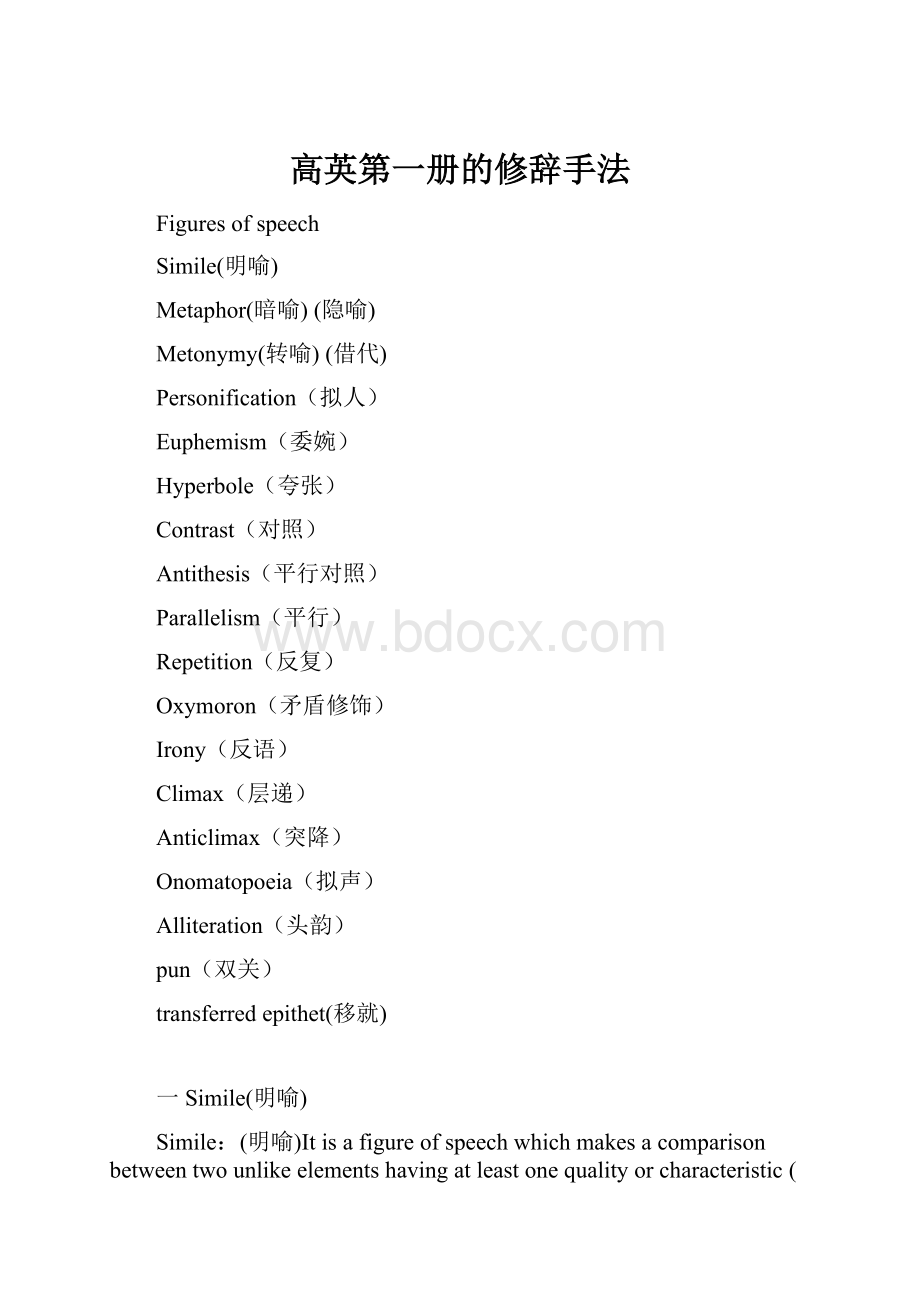高英第一册的修辞手法.docx
《高英第一册的修辞手法.docx》由会员分享,可在线阅读,更多相关《高英第一册的修辞手法.docx(46页珍藏版)》请在冰豆网上搜索。

高英第一册的修辞手法
Figuresofspeech
Simile(明喻)
Metaphor(暗喻)(隐喻)
Metonymy(转喻)(借代)
Personification(拟人)
Euphemism(委婉)
Hyperbole(夸张)
Contrast(对照)
Antithesis(平行对照)
Parallelism(平行)
Repetition(反复)
Oxymoron(矛盾修饰)
Irony(反语)
Climax(层递)
Anticlimax(突降)
Onomatopoeia(拟声)
Alliteration(头韵)
pun(双关)
transferredepithet(移就)
一Simile(明喻)
Simile:
(明喻)Itisafigureofspeechwhichmakesacomparisonbetweentwounlikeelementshavingatleastonequalityorcharacteristic(特性)incommon.Tomakethecomparison,wordslikeas,as...as,asifandlikeareusedtotransferthequalityweassociatewithonetotheother.
Simileisacomparisonbetweentwodifferentthingsthatresembleeachotherinatleastoneway.Informalprosethesimileisadevicebothofartandexplanation,comparinganunfamiliarthingtosomefamiliarthing(anobject,event,process,etc.)knowntothereader.
Forexample,
Ascoldwaterstoathirstysoul,soisgoodnewsfromafarcountry.
1.Simile通常由三部分构成:
本体(tenororsubject),喻体(vehicleorreference)和比喻词(comparativewordorindicatorofresemblance)。
eg:
Myloveislikearedredrose.
tenorcomparativewordvehicle
2.句型
(1).like型
★A联系动词(以tobe居多)+like
Eg:
Livingwithoutanaimislikesailingwithoutacompass.
生活没有目标犹如航行没有指南针
Thechildrenwentfromadulttoadultlikebucketsinafirebrigade.
★实意动词+like。
Theywillneverbeabletosavemoneytobuyanewhouse——theybothspendmoneylikewater.
★as型
as在明喻句中用作介词,后跟名词。
也可用作连词,后跟状语从句,表示动作或行为的方式。
此外,还有两个常用句型,即as…as…和as…so…。
英语里有不少含有明喻的成语,其结构为as+形容词+as+名词(第一个as可省略)。
例如:
(as)firmasarock坚如磐石
(as)lightasafeather轻如鸿毛
(as)closeasanoyster守口如瓶
(as)muteasafish噤若寒蝉
(as)strongasahorse强壮如牛
(as)coolasacucumber泰然自若
(as)soberasajudge十分清醒
(as)sureasagun千真万确
★虚拟句型
最常见的是asif/though,另外还有其他一些形式。
Eg:
HewasabeautifulhorsethatlookedasthoughhehadcomeoutofapaintingbyVealsquez.
这匹马真雄俊,看起来仿佛是从一副维拉斯奎兹的油画里跑出来的一样。
Thedogswereinfullcry,theirnosesdown,theirtailsup,soclosetogetherthatmighthavebeenonegreatyellowandwhitemovingcarpet.
那群狗吠叫着追猎,低着头,翘着尾巴,一条挨一条,看上去就像一块行进的黄白交织的大地毯。
Hewokethembothupgettingtobed,butwhentheytriedtowakehimupafterwardstheymightaswellhavetriedtowakethedead.
他去睡觉的时候把他们两个都弄醒了,但是后来他们想唤醒他时,简直就像唤死人一样。
★what型
A.AistoBwhatXistoY
Eg:
Readingistothemindwhatexerciseistothebody.
阅读之于思想,如同锻炼之于身体。
Judiciouspraiseistochildrenwhatthesunistoflowers.
明智的表扬对于孩子的作用,就像阳光对于花朵的作用。
BWhatXistoY,AistoB.
Eg:
Whatsaltistofood,thatwitandhumouraretoconversationandliterature.
妙语与幽默对于会话与文学,恰似盐对于食物一样。
Whatbloodvesselistoaman’sbody,thatrailwayistotransportation.
铁路对于运输,好比血管对于人体一样。
二、Metaphor(隐喻)(暗喻)
Metaphor:
(暗喻)Itislikeasimile,alsomakesacomparisonbetweentwounlikeelements,butunlikeasimile,thiscomparisonisimpliedratherthanstated.
Forexample,theworldisastage.
Metaphorcomparestwodifferentthingsbyspeakingofoneintermsoftheother.Unlikeasimileoranalogy,metaphorassertsthatonethingisanotherthing,notjustthatoneislikeanother.Veryfrequentlyametaphorisinvokedbythetobeverb:
Metaphoriscompressedsimile(简缩了的明喻)。
在实际运用中Metaphor有时仅出现喻体,本体需要从上下文中分析推敲出来。
英语Metaphor的运用格式灵活多样,它可以体现在任何句子成分上,如主语、谓语、表语、定语、宾语或状语。
在表达上它可以是一个单词、一个词组或一个句子,甚至是一个段落。
以下为英语Metaphor的常见运用格式:
★名词型
最常见的句式是“甲是乙”,喻体一般体现在句子的表语部分。
Alltheworld’sastage,andallthemenandwomenmerelyplayers.
整个世界是座舞台,男男女女,演员而已。
Moneyisabottomlesssea,inwhichhonour,conscience,andtruthmaybedrowned.
金钱是无底的海洋,荣誉、良心和真理都可以淹没在其中。
★动词型
Theboywolfeddownthefoodthemomenthegrabbedit.
那男孩儿一抓到食物便狼吞虎咽般地吃了下去。
Somebooksaretobetasted,othersswallowed,andsomefewtobechewedanddigested。
书有可浅尝者,有可吞食者,少数则须咀嚼消化。
★形容词型
Shehasaphotographicmemoryfordetail.
她对细节有照相机般的记忆力。
Themountainouswavesswalloweduptheship.
山一般的巨浪吞没了那艘航船。
MarkTwainsuccumbedtotheepidemicofgoldandsilverfeverinthewest.
三、Metonymy(转喻)(借代)
Metonymy(转喻)Itisafigureofspeechthathastodowiththesubstitutionofthemaneofonethingforthatofanother.Forinstance,.BeneaththeruleofmenentirelygreatThepenismightierthanthesword.
该修辞故意不用需要说明的人或物的本称,而是借与该人或该物密切相关的事物名称来代替,即借乙名代甲称。
Metonymy的运用基础是联想,两个相互借代的事物必然紧密相关,存在某种现实的联系。
如:
Whatislearnedinthecradleiscarriedtothegrave(幼小所学,终生不忘),句中的thecradle与thegrave是跟birth与death密切相关的事物,因此两者之间形成了借代关系。
:
★以事物的特征代替事物本身
Athousandmustachescanlivetogether,butnotfourbreast.
千条汉子能共处,两个婆娘难相容。
★以工具代替动作或行为者
Ahundredbayonetsweremarchingdownthestreet.
100把刺刀正沿街前进。
★以容器代替其中内容。
Whenevermyhusbandhasabaddayattheoffice,hehitsthebottle.
每当我丈夫在办公室不顺心,他就会喝得酩酊大醉。
★以人体器官代替其功能
Thepracticedearcanrecognizeaclassicflavour.
有音乐修养的人能够听出古典音乐的韵味。
Shehastheeyeforthefairandthebeautiful.
她有审美眼光。
Ihaveanopinionofyou,sir,towhichitisnoteasytogivethemouth.
我对你有一个意见,先生,不过很难用话语表达出来。
★以人或动物代替其特性
Thereisstillmuchoftheschoolboyinhim.
他身上还有许多小学生的气质。
Thewolfandthepigmingledtogetherinhisface.
凶残与贪婪交织在一起,浮现在他的脸上。
★以原材料代替制成品
The25thGamesinBarcelonasaw4goldsand5silversinswimmingfallintoChina’spockets.
在巴塞罗那举行的第25届奥运会上,游泳项目有4枚金牌、5枚银牌落入了中国队的囊中。
Andashepluck’dthecursedsteelaway,当他拔出那可恶的凶器的时候
MarkhowthebloodofCaesarfollowed…瞧,恺撒的血是怎样跟着它流出来
★以作者或生产者代替作品或产品
Thecaptain…hadfalleninpossessionofacompleteShakespeare.
船长…得到了一整套的莎士比亚作品。
WedroveaFordtoHydePark.
我们驾驶一辆福特到海得公园去。
★以具体事物代替抽象事物
Althoughhisplanhadnotcompletelysucceeded,shegavehimapatonthebackforhavingtriedsohard.
尽管他的计划未获完全成功,但她对他作出的努力表示赞许。
Hispenwouldprovemightierthanhispickaxformakingmoney.
★以抽象事物代替具体事物
Inthepresentinstance,itwassicknessandpovertytogetherthatshecametovisit.
在目前这种情况下,她一并前来探望的是病人和穷人以事物活动的处所代替事物或活动者
Sheisanageingoperasingerwhohasretiredfromthestagetoteach.
她是一位年迈的歌剧演员,现已退出舞台从事教学。
★地名或建筑物名可借以代称设于那里的机构。
如:
Kremlin(克林姆林宫,俄罗斯政府)ThePentagon(五角大楼,美国国防部)Hollywood(好莱坞,美国电影业)DowningStreet(唐宁街,英国政府)FoggyBottom(雾谷,美国国务院)BuckinghamPalace(白金汗宫,英国皇室)等等。
五、Personification(拟人)
Personification:
(拟人)Itgiveshumanformoffeelingstoanimals,orlifeandpersonalattributes(赋予)toinanimate(无生命的)objects,ortoideasandabstractions(抽象).Forexample,thewindwhistledthroughthetrees.
★.Lazinesstravelssoslowly,thatpovertysoonovertakeshim.
懒惰缓慢而行,贫穷迎头赶上。
。
★.Liquortalksmightyloudwhenitgetsloosefromthejug.
酒一从酒壶里溜出来就会大言不惭。
★.Itisuselessforthesheeptopassresolutionsinfavorofvegetarianismwhilethewolfremainsofadifferentopinion.
当狼依然持有不同意见之时,群羊要通过赞成素食主义的决议案也是无济于事的。
★.Mosquitoeswereusingmyanklesforfillingstations.
蚊子把我的脚脖子当作了加油站。
★.Timeislikeafashionablehost,thatslightlyshakeshispassingguestbyth’hand;andwithhisarmsstretched,ashewouldfly,graspsinthecomer.Thewelcomeseversmile,andfarewellgoesoutsighing.(WilliamShakespeare)
时间正像一个趋炎附势的主人,对于一个临去的客人不过和他略微握一握手,对于一个新来的客人,却伸开了双臂,飞也似地过去抱住他。
欢迎是永远含笑的,告别总是带着叹息。
★.Aliecantravelhalfwayaroundtheworldwhilethetruthisputtingonitsshoes.
(MarkTwain)
当真理刚刚穿上鞋子,谎言就可能已经走了半个世界。
Bitternessfedonthemanwhohadmadetheworldlaugh
★.HowsoonhathTime,thesubtlethiefofyouth,stolenonhiswingmythreeandtwentiethyear!
(JohnMilton)
时间,这个盗窃青春的狡猾的小偷,盗窃了我二十又三年飞走了。
六.Euphemism(委婉)
Euphemism:
(委婉)Itisthesubstitutionofanagreeableorinoffensive(无冒犯)expressionforonethatmayoffendorsuggestsomethingunpleasant.Forinstance,wereferto"die"as"passaway".
★Euphemism(委婉),以文雅、悦耳或温婉来代替粗野、刺耳或直露。
借助语音、语法、词汇,表达生活中使人尴尬、惹人不快、招人厌恶或令人恐惧的事物。
Euphemism又叫sweettalk(甜言蜜语),gildedwords(镀金的字眼)或cosmeticwords(化装词)
有关疾病、残疾、衰老、死亡
★疾病
Lookoffcolour(气色不好,指身体有病)
undertheweather(在恶劣天气条件下,指健康欠佳)
notallthere(神志不清,实指患精神病)
longillness(久病,实指癌症)
socialdisease(实指艾滋病)。
替代illness或disease婉称疾病的词有condition,disorder,problem,trouble等。
★残疾
Disabled(丧失能力的)
handicapped(受到障碍的),
inconvenienced(行动不便的),
hardofhearing(听觉困难的),
auditory-impaired(听觉损伤的)表示“耳聋的“;
sight-deprived(被剥夺视力的)
visuallyretarded(视力上有障碍的)指“失明”。
★衰老
“衰老”的委婉说法
Advancedinage(年岁上先行的)
pastone’sprime(已过壮年)
feelone’age(感觉上了年纪)
goldenage(金色岁月)
sunsetyears(日落之年)
表示“老人”
seniorcitizen(资深的公民),
thelongerliving(生活经历较长者)。
★.死亡
多达上百条。
如,gowest(西去),beatrest(安息),beasleepintheArmsofGod(安睡在上帝的怀抱中),gothewayofallflesh(走众生之路),joinone’sancestors(加入祖先的行列),returntodust(归之尘土),breatheone’slast(作最后一次呼吸),passaway(离去),runone’srace(跑完自己的赛程),benolongerwithus(与我们永别了)。
★以下为一些实际用例,部分出自名家笔下,堪称巧用英语委婉的典范。
▲And,itbeinglowwater,hewentoutwiththeside.
正是退潮的时候,他跟潮水一道去了。
*作者用“驾潮而去”表示“溺水而死”,话说得哀婉动人。
▲Ifyouwillallowme,Iwillcallyourcarriageforyou.
如果你愿意的话,我去给你叫辆车。
*以“去给你叫辆车”委婉地下达了逐客令,却礼貌、得体。
▲Theboyusedtotakethingswithoutpermissionandhasjustbeenoutoftherehabilitationhomeinthecountry.那男孩以往常不经允许拿走东西,他刚从乡间的康复中心出来。
*“不经允许拿走东西”实际指“偷窃”,“康复中心”实际是“劳教所”的婉称。
▲Hepardonedusoff-hand,andallowedussomethingtoliveontillhewentthewayofallflesh.
他轻易地就原谅了我们,并且直到他逝世为止还一直供给我们生活费。
▲I’mafraidshecan’tactthatpart——sheisalittleontheplumpside.
恐怕她扮演不了那个角色——她有些发福。
▲Thereactorbegantorunoutofcontrol“abovecritical”intheparlanceofthenuclearengineer.反应堆开始失控——或者用核工程师的话来说:
处于临界点之上。
*abovecritical实际为“核反应堆泄露”。
政府在处理核事故时用词尤慎,惟恐引起民众恐慌或愤怒。
▲Hewasbothoutofpocketandoutofspiritsbythatcatastrophe,failedinhishealthandprophesiedthespeedyruinoftheempire.
经过这次灾难,他手头拮据,总是无精打采,身体也不好,时常预言大英帝国不久便会垮台。
*作者用委婉语outofpocket代替poor或bankrupt这类羞于启齿之词,而且与outofspirits同一结构,相映成趣。
七、Hyperbole(夸张)
Hyperbole:
(夸张)Itisthedeliberateuseofoverstatementorexaggerationtoachieveemphasis.
aconsciousexaggerationfotthesakeofemphasis.Notintendedto